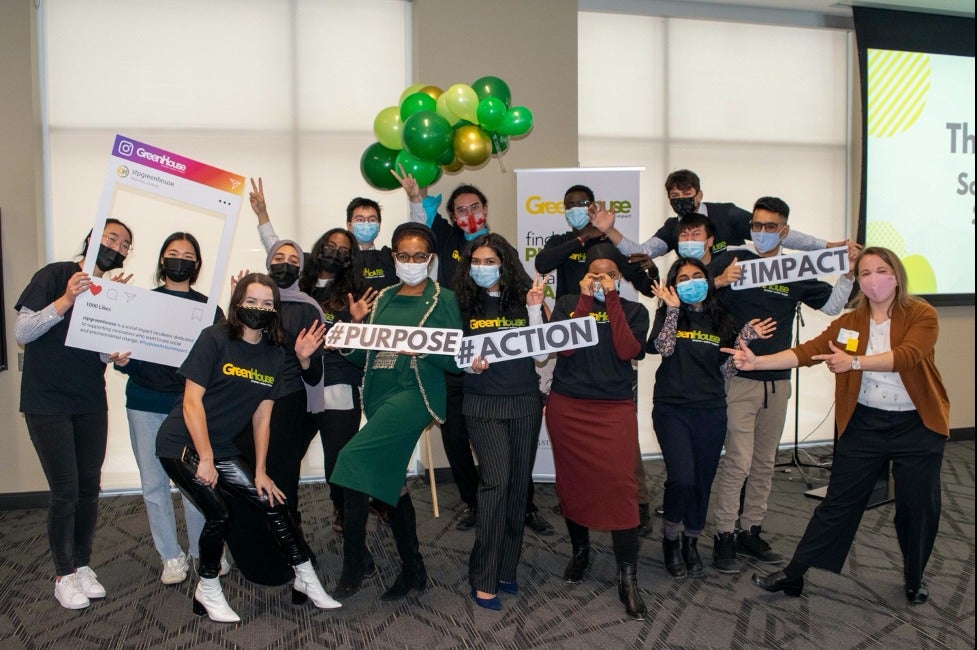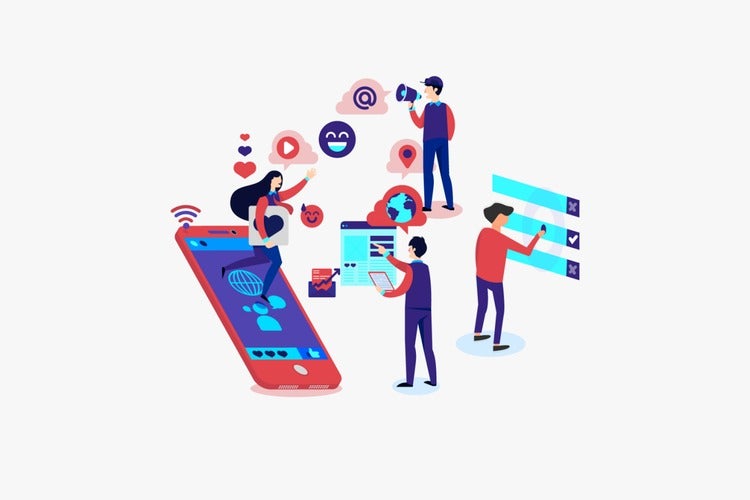Editor:
Brandon Sweet
University Communications
bulletin@uwaterloo.ca
GreenHouse announces Social Impact Fund fall term winners

A message from St. Paul's GreenHouse.
The Social Impact Showcase celebrates the amazing work that GreenHouse students have accomplished throughout their social innovation journeys. Four out of the seven student teams that pitched last week were awarded funding to support their ventures from the Social Impact Fund, established by St. Paul’s University College.
This term students focused their ventures on solar energy, physical and mental health issues and career education and experience for high schoolers.
And the winners are…
Aqua-Cell Energy, awarded $7,500, is a start-up focused on providing cost-effective solar energy storage for businesses and is led by Keith Cleland, Faculty of Engineering.
Mattrics, awarded $3,000, is designing a non-invasive mat that records body metrics during sleep, so occupational therapists can craft custom and effective solutions to meet the sleep needs of children with Cerebral Palsy. Members of the Mattrics team includes 5 upper year Faculty of Engineering students: Ayesha Ebrahim, Sophy Li, Julie Lee, Sumaiya Islam and Danielle Seunarine.
iContribute, awarded $2,500, is a mobile app that empowers high school students to discover meaningful opportunities and gain career-related experience. iContribute’s team is led by Mesha Naidoo-Edwardson - Faculty of Math, HaoHao Du and Umai Balendra – who are both enrolled in Computer Science at Carleton University.
Cocoon, awarded $1,000 for winning the People’s Choice Award, is a platform aimed to care for caregivers by providing resources and supports. Cocoon is led Kinza Ahmed – Faculty of Science and Isra Ziad – Faculty of Health.
Congratulations to all the students who participated in the Fall 2021 Social Impact Showcase and thank you to over 300 community members who took the time to vote for their favourite venture. Here’s to our students’ continued success moving forward.
Bullet Time? How about Coffee Time: caffeine improves reaction to moving targets

In the first study of its kind to explore caffeine’s effects on dynamic visual skills, researchers concluded that caffeine increases alertness and detection accuracy for moving targets. Caffeine also improved participants’ reaction times.
“A lot of what happens in our environment is moving—like trying to cross a busy intersection as a pedestrian or finding something on a shelf as you’re walking through the aisles of a grocery store,” said Dr. Kristine Dalton of Waterloo’s School of Optometry & Vision Science. “Testing visual acuity under dynamic conditions can provide more information about our functional performance in these scenarios than traditional static visual acuity measurements alone.”
Visual acuity, also known as clarity of vision or sharpness of vision, refers to a person’s ability to detect and recognize small details and can be measured under static (stationary) or dynamic (moving) conditions. While both static and dynamic visual acuity provide important information about how we interact with the world around us, dynamic visual acuity skills are especially important in the many daily activities in which we, or objects around us are moving.
“While we already know that caffeine increases the velocity of rapid-eye movements, we wanted to further investigate how exactly caffeine enhances visual processing and facilitates the detection of moving visual stimuli by testing dynamic visual acuity,” said co-author Beatríz Redondo of the University of Granada’s Department of Optics.
On two separate days, half of the study’s participants ingested a caffeine capsule (4mg/kg) while the other half ingested a placebo capsule. Using a computer-based test designed and validated at the University of Waterloo, each participant’s dynamic visual acuity skills were measured before and 60 minutes after caffeine ingestion.
Researchers found that participants who had ingested the caffeine capsules showed significantly greater accuracy and faster speed when identifying smaller moving stimuli, inferring caffeine positively influences participants’ stimulus processing and decision-making. Eye movement velocity and contrast sensitivity, which are implicated in dynamic visual acuity performance, were also sensitive to caffeine intake.
“Our findings show that caffeine consumption can actually be helpful for a person’s visual function by enhancing alertness and feelings of wakefulness,” Dalton said. “This is especially true for those critical, everyday tasks, like driving, riding a bike or playing sports, that require us to attend to detailed information in moving objects when making decisions.”
The study, Effects of caffeine ingestion on dynamic visual acuity, co-authored by Waterloo’s School of Optometry & Vision Science’s Dalton, and the University of Granada’s Redondo, Raimundo Jiménez, Rubén Molina and Jesús Vera, was recently published in the Journal of Psychopharmacology.
Social media revenue sharing means you could profit from every post

By Patty Mah. This article was originally published on the School of Accounting and Finance website.
Web surfers googling questions can receive the answers they’re looking mostly for free. With the digitization of content new business models and opportunities to generate revenue such as subscription-based and pay-per-item models are becoming more popular. Digital content consumers may soon need to empty our pockets to get timely answers from well-sourced and respected digital contributors.
A collaborative study by researchers from the universities of Waterloo, Oklahoma, Auckland, and Zhejiang Gongshang, determined that Facebook, Twitter, and potentially other less than profitable social media platforms can migrate from an ad-based revenue model to a paid question and answer (Q&A) model. Theophanis Stratopoulos, associate professor at the University of Waterloo and his group found that successful platforms such as Weibo Q&A, utilize a model that generates revenue from paid viewership within a paid Q&A platform where the askers, answerers, and the platform share in the profits. This unique revenue sharing model among all stakeholders ensures the sustainability of the social media platform and incentivizes both the askers and answerers to contribute quality content and heightens the engagement of viewers and their content purchasing.
“Imagine if nobody posted content on Facebook,” notes Stratopoulos. “We visit social media platforms because we want to consume content produced by other users. Yet, under the existing model, Facebook contributors are not compensated for their work.”
This study is one of the first to validate the direct positive impact of social media status and social endorsement on the sales of paid viewership. Prior to this study, understanding of digital content consumption had primarily been focused on the free content model. Understanding of the drivers of the sales of paid viewership is a crucial component to leveraging and developing viable content monetization models. The collaborative study looked at the unique design features that differentiate the paid Q&A models from the free models – question price and content perishability. In a paid Q&A platform, users pay a viewership fee and revenues from the sales of viewership fees are shared among the stakeholders. The research provided a more nuanced understanding of how question price and content perishability alters viewers’ payment decisions.
“Our study examines a scenario where revenue sharing is beneficial for contributors and social media platforms,” explains Stratopoulos. “Content within social medial platforms tend to behave like hot cookies. They sell better when they’re fresh creating a constant need to entice users to provide new content. Currently, users have no monetary incentive to provide new content.”
While the social media status of an answerer can have a significant effect on the sales of paid viewership, it is critical for the digital content platform to build effective status-ranking mechanisms that can verify the answerer’s social identity and integrity. Interactions and endorsements from other users also affect the sales of paid viewership as more viewers engage and interact to raise content awareness.
“The idea that a user who posts on Facebook, Instagram or any other social media platform should receive a payment representing their contribution to the company’s revenues may sound preposterous," says Stratpoulos. "However, the gradual adoption and/or creation of new platforms built on blockchain technology will make the solution to such accounting problem trivial.”
The study, Monetization of Digital Content: Drivers of Revenue on Q&A Platforms, by Hua Jonathan Ye (University of Oklahoma), Xueping Yang (Zhejiang Gongshang University), Xinwei Wang (University of Auckland), and Theophanis Stratopoulos (University of Waterloo) demonstrates that a revenue sharing model would help platform managers to address the perishability of content problem in a way that is beneficial for both sides.
Campus menorah lighting today; other notes

Today at 4:00 p.m., Rabbi Moshe Goldman, member of UW Chaplains and Director of the The Rohr Chabad Centre for Jewish Life will be hosting the inaugural University of Waterloo campus menorah lighting on the Bomber Patio outside the Student Life Centre to celebrate Hanukkah with students and the broader campus community.
"If by chance you are on campus and available, we would love to have you join the celebrations as well," writes Maryam Latifpoor-Keparoutis of the Faculty of Environment. "Hanukkah is a joyous Jewish holiday which celebrates the miracles in our lives, including our family, community, and our faith in a better tomorrow."
In 2021, Hanukkah began on Sunday night and will end next Monday evening. Today, observers will mark the 5th of Hanukkah's 8-day celebrations. The event will run from 4:00 p.m. to 5:00 p.m. Proof of vaccination will be required to attend the event.

"Career-ing: Figuring It Out" Is a podcast created and run by University of Waterloo students for the purpose of helping other students navigate life at Waterloo," says a note from the Centre for Career Action. "This podcast focuses mainly on the development of academic and professional skills in a casual manner, through interviews with UWaterloo students. We cover topics such as staying organized in class to finding co-ops and developing business skills. We want to amplify voices that the mainstream discourse does not listen to and offer a platform to share unusual work-experiences, shine light on neglected issues and non-linear paths."
"The podcast offers a platform for students to share their story. If you are interested in learning how other Waterloo students developed some of these skills through their experiences as a student, tune in. We have a new 1-on-1 interview being posted on SoundCloud every Monday."
Upcoming office closures
The Centre and Watcard office will be closed on Tuesday, December 7 until 10:00 a.m.
Campus Wellness locations will be closed on Tuesday, December 7, from 11:00 a.m. to 2:00 p.m.
Link of the day
International Day for the Abolition of Slavery
When and Where to get support
Students can visit the Student Success Office online for supports including academic development, international student resources, immigration consulting, leadership development, exchange and study abroad, and opportunities to get involved.
Instructors looking for targeted support for developing online components for blended learning courses, transitioning remote to fully online courses, revising current online courses, and more please visit Agile Development | Centre for Extended Learning | University of Waterloo (uwaterloo.ca).
Instructors can visit the Keep Learning website to get support on adapting their teaching and learning plans for an online environment.
Course templates are available within your course in LEARN to help you build and edit your content and assignment pages quickly.
The following workshops, webinars, and events are offered by the KL team (CTE, CEL, ITMS, LIB):
- Independent Remote Course Design Essentials, self-directed, continuous self-enrollment course in LEARN.
- Independent Blended Course Design (iBlend), self-directed, ongoing
- Copyright Overview for Waterloo Instructors and Staff - self-directed, continuous self-enrollment course in LEARN.
-
Integrating PebblePad Retreat (IPR) -Setting up your Winter 2022 PebblePad Assignments and Activities (CTE 7531) - December 7, 1:00 p.m.
Employees can access resources to help them work remotely, including managing University records and privacy of personal information. Here are some tips for staying healthy while working from home.
Stay informed about COVID cases on campus by consulting the COVID case tracker.
The Writing and Communication Centre has virtual services and programs to help undergrads, grad students, postdocs and faculty members with academic writing.
- Meet with writing advisors in one-to-one appointments to brainstorm, draft, revise, and polish. No time for an appointment? Try email tutoring for undergrads.
- Beat isolation and make writing progress at weekly Virtual Writing Cafés for grad students and faculty or PJ-Friendly Writing Groups for Undergrads.
- Take an online workshop or apply to our popular Dissertation Boot Camp program.
- Faculty can request custom in-class workshops for their courses, or the WCC can facilitate any existing workshops for student groups.
Co-op students can get help finding a job and find supports to successfully work remotely, develop new skills, access wellness and career information, and contact a co-op or career advisor.
The Centre for Career Action (CCA) is offering some in-person services for fall 2021. The Tatham Centre is open with front-desk support, limited in-person appointments and co-op consults. Services are also available virtually. Book an appointment online or Live Chat with our Client Support Team. The CCA is here to help.
If you feel overwhelmed or anxious and need to talk to somebody, please contact the University’s Campus Wellness services, either Health Services or Counselling Services. You can also contact the University's Centre for Mental Health Research and Treatment. Good2Talk is a post-secondary student helpline available to all students.
While the Library continues to focus on digital resources and consultations, our spaces are open for the fall term. Dana Porter Library is open Monday to Friday, 9 a.m. to 5 p.m., and Davis Centre Library is open Monday to Friday, 9 a.m. to 11 p.m., and Saturday and Sunday, 11 a.m. to 5 p.m. for drop-in individual study space, bookable individual study rooms, drop-in access to computers and printers, book pick-up services and IST Help Desk support. Special Collections & Archives and the Geospatial Centre will be accessible by appointment. Library staff are available for questions via Ask us. Full details on current services and hours are available on the Library’s COVID-19 Update webpage.
The Faculty Association of the University of Waterloo (FAUW) continues to advocate for its members. Check out the FAUW blog for more information.
The University of Waterloo Staff Association (UWSA) continues to advocate for its members. Check out the UWSA blog for more information.
The Sexual Violence Prevention and Response Office (SVPRO) supports all members of the University of Waterloo campus community who have experienced, or been impacted, by sexual violence. This includes all students, staff, faculty and visitors on the main campus, the satellite campuses, and at the affiliated and federated Waterloo Institutes and Colleges. For support, email: svpro@uwaterloo.ca or visit the SVPRO website.
The Office of Indigenous Relations is a central hub that provides guidance, support, and resources to all Indigenous and non-Indigenous campus community members and oversees the University's Indigenization strategy.
The Waterloo Indigenous Student Centre, based at St. Paul’s University College, provides support and resources for Indigenous students, and educational outreach programs for the broader community, including lectures, and events.
WUSA supports for students:
Peer support - MATES, Glow Centre, RAISE, Women’s Centre - Visit https://wusa.ca/peersupport to book an appointment either in person or online for the Fall term!
Food Support Service food hampers are currently available from the Turnkey Desk 24/7 in the Student Life Centre. Drop off locations are also open again in SLC, DC, DP, SCH and all residences.
Co-op Connection all available online. Check https://wusa.ca for more details.
Centre for Academic Policy Support - CAPS is here to assist Waterloo undergraduates throughout their experience in navigating academic policy in the instances of filing petitions, grievances and appeals. Please contact them at caps@wusa.ca. More information is available.
WUSA Student Legal Protection Program- Seeking legal counsel can be intimidating, especially if it’s your first time facing a legal issue. The legal assistance helpline provides quick access to legal advice in any area of law, including criminal. Just call 1-833-202-4571.
Empower Me is a confidential mental health and wellness service that connects students with qualified counsellors 24/7. They can be reached at 1-833-628-5589.
When and Where (but mostly when)
Healthy Warriors at Home (Online Fitness).
Warriors vs. Laurier Blood Donation Battle. Join your fellow Warriors, donate blood and help us win the Blood Battle against Laurier for a second year in a row. Set up a profile or add the PFL code: UNIV960995 to your account if you have a blood.ca account already. Questions? Contact WarriorsInfo@uwaterloo.ca.
Drop-in to Warrior Virtual Study Halls on Wednesdays from 5:30 p.m. to 7:00 p.m. Come together in this virtual space to set goals and work independently or in groups each week.
Renison English Language Institute continues to offer virtual events and workshops to help students practice their English language skills.
Indigenous Speakers Series presents Jean Teillet, Thursday, December 2, 12 noon.
Decolonizing Qualitative Approaches, Thursday, December 2, 12 noon to 1:30 p.m.
‘It Takes a Village’: Mentorship in Health, Sport, and Leisure Studies, virtual Hallman Lecture Friday, December 3, 1:00 p.m. to 2:30 p.m. by Shaw-Mannell Leisure Research Award recipient for 2021, Dr. Lucie Thibault, Professor and Dean of Faculty of Health Sciences, University of Ottawa.
International Day of Persons with Disabilities keynote event featuring Chris Downey, Friday, December 3, 1:30 p.m. to 2:30 p.m. Register through Portal.
Men’s Hockey vs. Windsor, Saturday, December 4, 4:00 p.m.,Camps and Minor League Day, Employee Day, The Alliance “We Are One” Game. Free tickets available for Staff and Faculty; email WarriorsTickets@uwaterloo.ca for the coupon code. Purchase your tickets today.
National Day of Remembrance and Action on Violence Against Women, Monday, December 6, 10:30 a.m.
Friesen Lecture with Sir Mark Walport, “When Science meets Society: the competition between knowledge and values,” Wednesday, December 8, 10:30 to 11:30 a.m., virtual event via MS Team Live, register to received event link.
TD Walter Bean Lecture in Environment, “MAD Water: mobile, adaptive and decentralized infrastructure for the climate change era,” Wednesday, December 8, 6:00 p.m.
UWSA presents Steady State Q&A, Thursday, December 9, 12 noon until 1:00 p.m., via Teams. Submissions (webform) will be accepted until 4:00 p.m. on Thursday, December 2.
PhD Oral Defenses
Computer Science. Andreas Stöckel, “Harnessing Neural Dynamics as a Computational Resource.” Supervisor, Chris Eliasmith. Thesis available from MGO – mgo@uwaterloo.ca. Oral defence Monday, December 6, 8:00 a.m.
Computer Science. Dmitrii Marin, “Higher-order Losses and Optimization for Low-level and Deep Segmentation.” Supervisor, Yuri Boykov. Thesis available from MGO – mgo@uwaterloo.ca. Oral defence Monday, December 6, 9:00 a.m.
School of Public Health Sciences. Melissa Pirrie, “Multi-level analysis of school characteristics, based on the Comprehensive School Health Framework, associated with physical activity in a large sample of Ontario secondary school students.” Supervisor, Scott Leatherdale. Email Health Graduate Administration: ahs.graduate.administration@uwaterloo.ca for a copy. Oral defence Monday, December 6, 10:00 a.m.
School of Public Health Sciences. Gillian Williams, “Characterizing poly-substance use and its associations with anxiety and depression among a sample of Canadian high school students.” Supervisor, Scott Leatherdale. Email Health Graduate Administration: ahs.graduate.administration@uwaterloo.ca for a copy. Oral defence Tuesday, December 7, 12 noon.
Germanic & Slavic Studies. Ronald Samuel Schirm, “L2 discourse markers and the development of interactional competence during study abroad.” Supervisor, Emma Betz. Available upon request from the Faculty of Arts, Graduate Studies and Research Officer. Oral defence Wednesday, December 8, 9:00 a.m.
Biology. Casey Remmer, “Understanding Spatial and Temporal Patterns in Hydrological Processes in the Peace-Athabasca Delta using Water Isotope Tracers.” Supervisors, Roland Hall, Brent Wolfe. The thesis has been deposited in the Faculty of Science Graduate Office, PHY 2013, and is available for perusal until Wednesday, December 1, 2021. Please visit our Thesis Submission Notices for details on requesting a copy. Oral defence Wednesday December 8, 1:00 p.m.
School of Optometry & Vision Science. Alan Yee, “Uptake and release of preservatives from soft contact lens materials.” Supervisor, Lyndon Jones. The thesis has been deposited in the Faculty of Science Graduate Office, PHY 2013, and is available for perusal until Thursday, December 2, 2021. Please visit our Thesis Submission Notices for details on requesting a copy. Oral defence Thursday, December 9, 9:00 a.m.